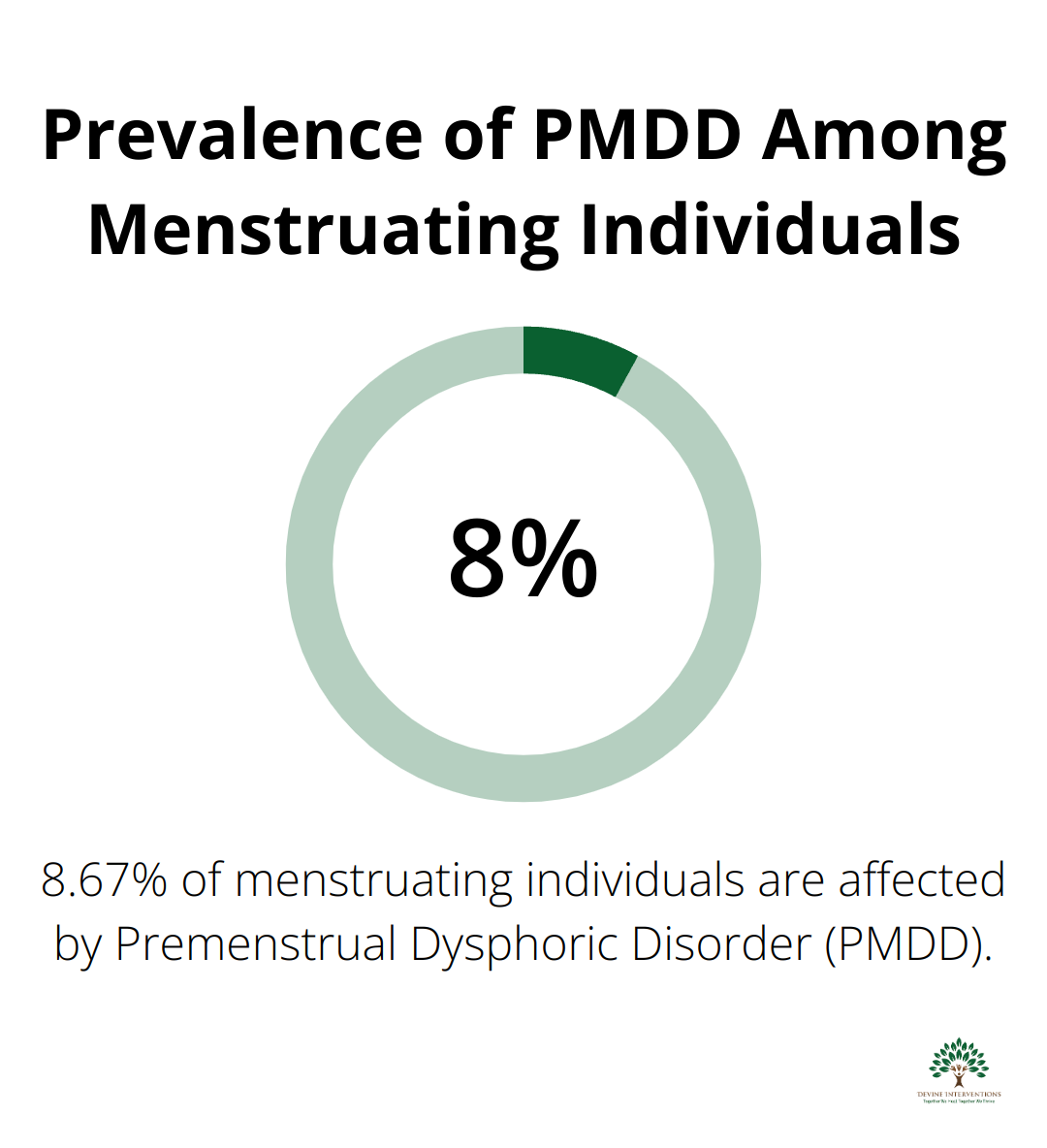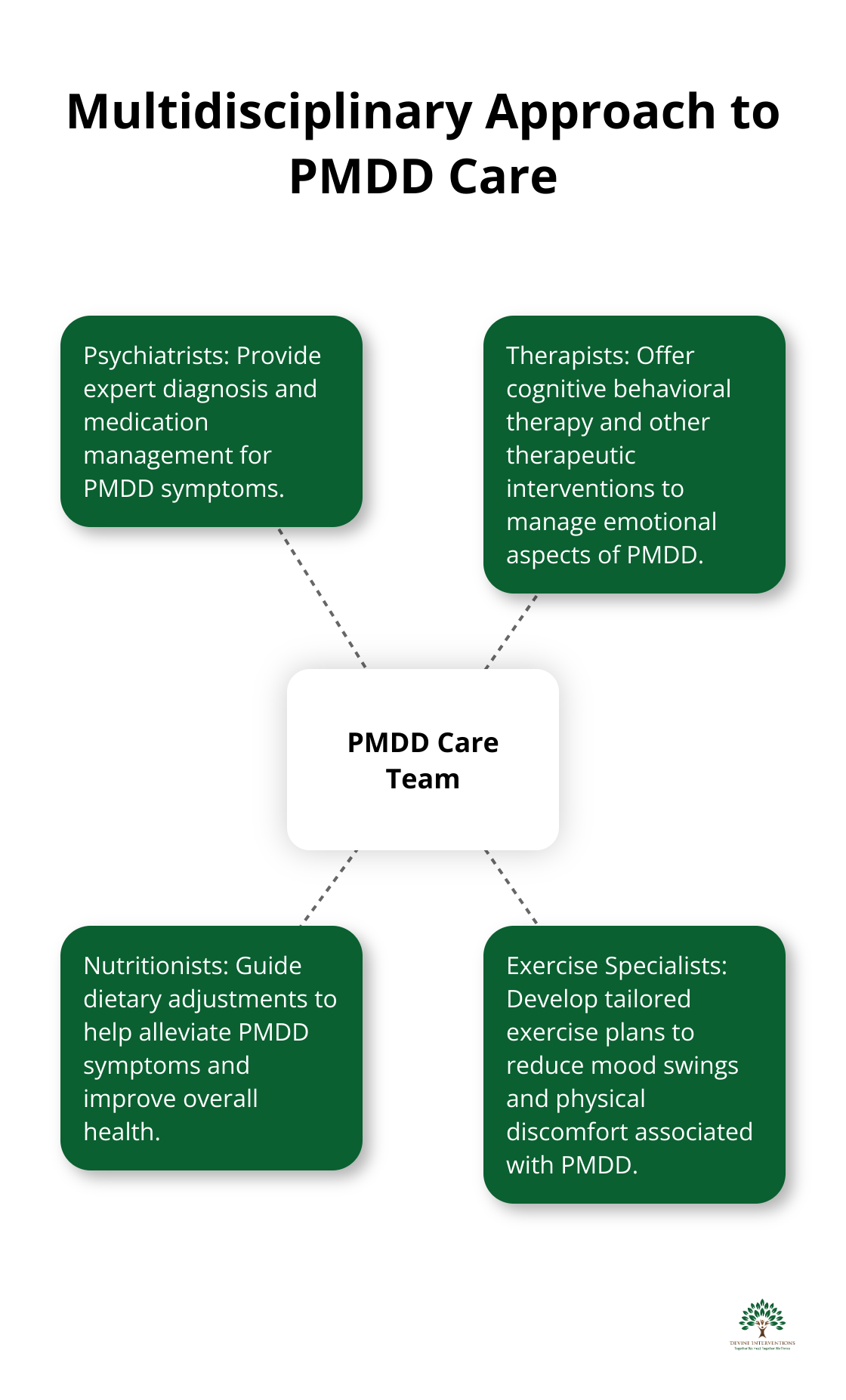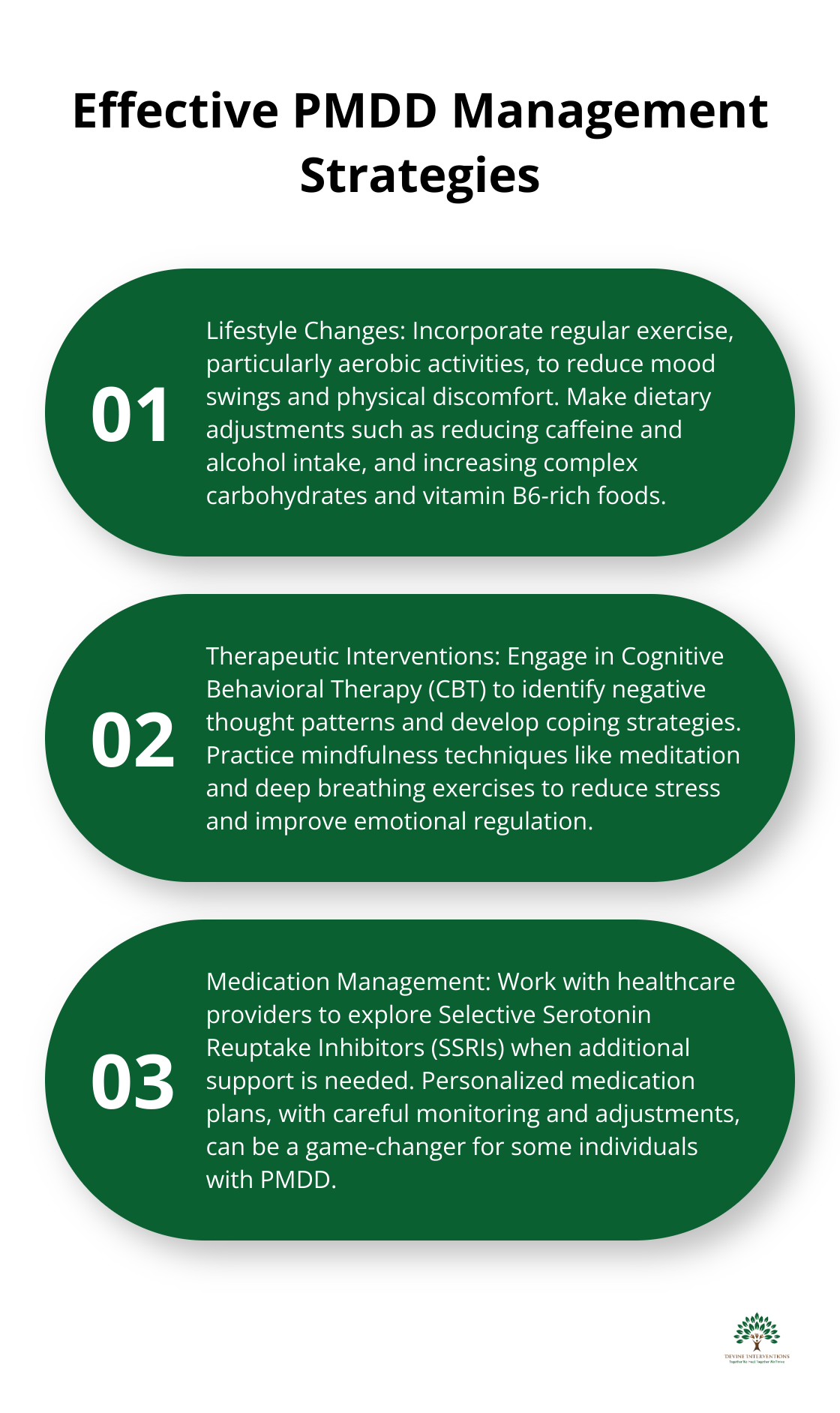Premenstrual Dysphoric Disorder (PMDD) can feel like an overwhelming storm in your life. It’s more than just mood swings or cramps – it’s a serious condition that affects your daily functioning and relationships.
At Devine Interventions, we understand the challenges you face. We’re here to guide you through understanding PMDD and finding effective ways to manage its symptoms.
What is PMDD and How Does it Affect You?
Understanding Premenstrual Dysphoric Disorder (PMDD)
Premenstrual Dysphoric Disorder (PMDD) affects 8.67% of menstruating individuals, according to a recent study. This severe form of premenstrual syndrome causes significant emotional and physical distress that disrupts daily life. PMDD goes beyond typical PMS symptoms, creating challenges that require professional attention.

Recognizing PMDD Symptoms
PMDD symptoms typically appear 7 to 10 days before menstruation. They include:
- Severe mood swings
- Intense irritability
- Overwhelming feelings of anxiety or depression
- Bloating
- Breast tenderness
- Fatigue
These symptoms can become so severe that they interfere with work, relationships, and overall quality of life. (It’s important to note that the intensity of these symptoms sets PMDD apart from regular PMS.)
PMDD vs. PMS: Key Differences
While PMS affects up to 90% of menstruating individuals, PMDD presents a much more severe condition. The primary distinction lies in the intensity of symptoms and their impact on daily functioning. PMS might cause mild irritability or bloating, but PMDD can lead to debilitating depression or anxiety that affects your ability to work or maintain relationships.
The Real-Life Impact of PMDD
PMDD profoundly affects various aspects of life:
- Work Performance: Menstrual disorders are associated with reduced workforce participation, mainly through reduced work productivity and increased work absenteeism. This can result in strained professional relationships and even job loss in some cases.
- Personal Relationships: The intense mood swings and irritability associated with PMDD can lead to conflicts with partners, family members, and friends. Many individuals report feeling isolated and misunderstood before seeking help.
- Quality of Life: The combination of physical and emotional symptoms can significantly reduce overall life satisfaction and well-being.
Seeking Professional Help
If you experience symptoms that align with PMDD, professional help becomes essential. Early diagnosis and treatment can significantly improve your quality of life and help you regain control. (Don’t let PMDD control your life – take the first step towards better mental health today.)
As we move forward, we’ll explore the importance of a supportive care team in managing PMDD effectively. A multidisciplinary approach can make a significant difference in your journey towards wellness.
Why a Supportive Care Team Matters for PMDD
The Power of Collaboration in PMDD Care
Premenstrual Dysphoric Disorder (PMDD) requires more than a one-size-fits-all approach. A supportive care team makes a world of difference in treatment outcomes. Experts from various fields create a comprehensive treatment plan. This team includes psychiatrists, therapists, nutritionists, and exercise specialists. This collaborative approach addresses all aspects of your health – physical, emotional, and mental.

A study in the Journal of Women’s Health revealed that patients who received care from a multidisciplinary team showed improvement in PMDD symptoms compared to standard care. (This highlights the importance of a team-based approach in managing PMDD effectively.)
Personalized Care: The Key to Better Outcomes
PMDD affects each woman differently. What works for one might not work for another. A dedicated team provides multiple perspectives to tailor your treatment plan to your specific needs and adjust it as necessary.
For example, one patient might benefit most from cognitive behavioral therapy, while another might see significant improvements with a combination of medication and lifestyle changes. A team’s diverse expertise allows exploration of all these options to find what works best for you.
Building a Support Network Beyond the Clinic
Care extends beyond office walls. We connect you with support groups, community resources, and even workplace accommodations if needed. This holistic approach helps you manage PMDD in all aspects of your life, not just during appointments.
The Role of Continuous Monitoring and Adjustment
A supportive care team continuously monitors your progress and adjusts your treatment plan accordingly. This ongoing assessment ensures that your care evolves with your needs. (Regular check-ins and open communication allow for timely modifications to your treatment strategy.)
Empowering You Through Education
A comprehensive care team educates you about PMDD, its effects, and management strategies. This knowledge empowers you to take an active role in your treatment. You’ll learn to recognize triggers, implement coping strategies, and communicate effectively with your support network.
As we move forward, we’ll explore the various treatment options available for PMDD. From lifestyle changes to therapeutic interventions and medication management, a range of strategies can help you regain control over your life.
How Can You Manage PMDD Effectively?
Lifestyle Changes: Your First Line of Defense
Small changes in your daily routine can have a big impact on PMDD symptoms. Regular exercise, particularly aerobic activities, can significantly reduce mood swings and physical discomfort. (This statistic underscores the power of physical activity in managing PMDD.)
Dietary adjustments also play a crucial role. Reduce caffeine and alcohol intake to help stabilize mood swings. Increase your intake of complex carbohydrates and foods rich in vitamin B6, such as chicken, fish, and potatoes, to alleviate symptoms. Many individuals report noticeable improvements after making these dietary changes.
Therapeutic Interventions: Tools for Long-term Management
Cognitive Behavioral Therapy (CBT) shows remarkable results in managing PMDD. This therapy helps you identify negative thought patterns and develop coping strategies. A study aims to establish the efficacy of CBT for PMDD, envisioning it as a potentially effective standalone or additional treatment.
Mindfulness techniques, such as meditation and deep breathing exercises, can also be powerful tools. These practices help reduce stress and improve emotional regulation. (Many individuals benefit from incorporating mindfulness into their daily routines.)
Medication Management: When Additional Support is Needed
For some women, lifestyle changes and therapy alone may not suffice. In these cases, medication can be a game-changer. Doctors often prescribe Selective Serotonin Reuptake Inhibitors (SSRIs) for PMDD. SSRIs probably reduce premenstrual symptoms in women with PMS and PMDD and are probably more effective when taken continuously compared to luteal phase only.
However, it’s important to work closely with a healthcare provider to find the right medication and dosage for you. Personalized medication management, with careful monitoring of your progress and adjusting treatment as needed, is essential.

Holistic Approach: Combining Strategies for Optimal Results
The most effective PMDD management often involves a combination of strategies tailored to your specific needs. Try different approaches and see what works best for you. A comprehensive treatment plan might include regular exercise, dietary changes, therapy sessions, and medication if necessary.
Seeking Professional Help: The First Step to Recovery
If you experience symptoms that align with PMDD, don’t hesitate to seek professional help. Early diagnosis and treatment can significantly improve your quality of life and help you regain control. At Devine Interventions, we offer personalized care plans that address all aspects of PMDD management. Our team of experts works with you to develop a tailored approach that fits your unique needs and lifestyle.
Final Thoughts
Premenstrual Dysphoric Disorder (PMDD) affects many aspects of life, from mood swings to physical discomfort. It disrupts daily routines, strains relationships, and impacts overall well-being. Effective management and treatment options exist for those who experience PMDD.
We at Devine Interventions understand PMDD’s complexities and offer personalized care. Our approach combines lifestyle changes, therapeutic interventions, and medication management when needed. We empower you with knowledge and tools to control your PMDD symptoms. (You don’t have to face this challenge alone.)
If you struggle with PMDD symptoms, reach out for support. Our team at Devine Interventions will guide you through your journey towards better mental health. With the right support and personalized treatment plan, you can manage PMDD effectively and reclaim control over your life.







